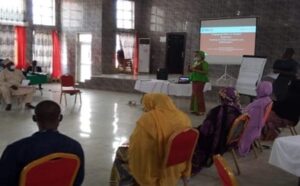Raising Men as Champions for Health
By Stella Abah, Gender, Social Inclusion, & Community Engagement Advisor, IHP Kebbi State, Nigeria
Engaging men as fathers during pregnancy is a positive entry point to improve reproductive, maternal, newborn, and child health (RMNCH) as well as couple relations. Men’s greater involvement in RMNCH can also open opportunities to improve men’s own sexual and reproductive health, disrupt intergenerational cycles of violence, and promote men’s roles as advocates for maternal, newborn and child health (MNCH) and sexual and reproductive health and rights (SRHR).[1] Gender inequality negatively impacts the health of women and children, including during pregnancy and the perinatal period, and there are multiple pathways linking gender inequity to poor health outcomes for women and men.[2]

Involving men in the health of women and newborns around the time of childbirth as partners and agents of change – including but not limited to supporting women during and after pregnancy; helping seek skilled care for the birth, newborn care, nutrition, and safe family planning after childbirth; and maternal mental health – has the potential to directly address systematic and pervasive negative gender influences on RMNCH outcomes in Kebbi state.
Why is male engagement important in RMNCH?
Male engagement is important in improving women’s access to and use of RMNCH services. Men also play a critical role in providing safe households for their children and equitable sharing of the burden of household and caregiving chores before pregnancy and long after the child is born.
To this end, the USAID Integrated Health Program (IHP) considers engaging men to be one of the core gender-transformative strategies that positively impact RMNCH outcomes, as well as increase the overall agency of women and girls. The Program seeks to engage men to promote long-term changes in gender relations and power dynamics that also addresses their own unique health needs and improves men’s relations with their partners and children.
The World Health Organization (WHO) recommends that MNCH interventions promote men’s involvement during pregnancy, childbirth, and after birth in order to:
- Facilitate and support improved self care of women;
- Improve home care practices for women and newborns;
- Improve the use of skilled care during pregnancy, childbirth, and the postnatal period for women and newborns; and,
- Increase the timely use of facility care for obstetric and newborn complications.
These interventions are recommended provided they are implemented in a way that respects, promotes, and facilitates women’s choices and their autonomy in decision-making and supports women in taking care of themselves and their newborns.[3]

In June 2020, IHP Kebbi identified and trained 22 all male influencers as “Health Champions” to address gender inequity, act as agents of change, and support other men to challenge pre-existing roles and norms surrounding masculinity, intimate partner relationships, and parenting. These targeted efforts will work to improve both gender-related and health outcomes for women and children and improve the lives of men themselves. Male traditional/religious leaders were trained on the importance of male involvement in promoting RMNCH, preventing gender-based violence (GBV), and challenging harmful cultural practices.
Additionally, IHP trained stakeholders and representatives selected from different ministries, departments, and agencies (MDAs), including the Kebbi Primary Health Care Development Agency, the State Ministry of Health, and the Ministry of Women Affairs and Social Development, on male engagement in the health system. The training also reviewed the best approaches in promoting male ownership and participation in the health system.
Promoting Sustainability
WHO strongly encouraged that gender-transformative, male-engagement interventions be designed in ways that can be sustainably scaled up or embedded (“institutionalized”) within the health system over the long term.[4] IHP will continue to integrate gender-transformative male engagement in the health system in its programming through messaging, training, mentoring, and capacity building of service providers, particularly on their roles in welcoming men and their partners, creating comfortable spaces, and providing male-friendly services. It will also work closely with traditional and religious leaders as influencers to see the benefits of and to support gender-transformative approaches to engaging men in RMNCH.
[1]Doyle, K., & Kato-Wallace, J. (2013). Male engagement in maternal, newborn, and child health/sexual reproductive health and rights. MenCare: A Global Fatherhood Campaign.
[2]Comrie-Thomson, L., Tokhi, M., Ampt, F., Portela, A., Chersich, M., Khanna, R., & Luchters, S. (2015). Challenging gender inequity through male involvement in maternal and newborn health: critical assessment of an emerging evidence base. Culture, health & sexuality, 17(sup2), 177-189.
[3] World Health Organization. (2015). WHO recommendations on health promotion interventions for maternal and newborn health 2015. World Health Organization.
[4] World Health Organization. (2020). Sexual and Reproductive Health. Available at: https://www.who.int/reproductivehealth/en/